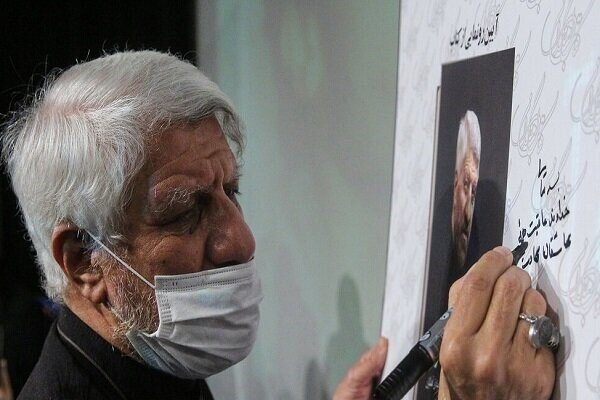Sadeq Ahangaran, “Khomeini’s nightingale”, releases his memoirs

TEHRAN – Eulogist Sadeq Ahangaran, who was dubbed by the Iraqi state radio “Khomeini’s nightingale” during the 1980-1988 Iran-Iraq war, has recently released his memoirs.
The memoirs entitled “Book of Ahangaran” was introduced during a meeting at Tehran’s Arasbaran Cultural Center on Monday.
Ahangaran, Minister of Cultural and Islamic Guidance Mohammad-Mehdi Esmaeili, and several cultural figures also attended the meeting.
“Hajji Sadeq is beloved by us and we see him in every stage of the revolution over the past 40 years,” Esmaeili said.
“I remember when the Iraqi radio called him ‘Khomeini’s nightingale’, and accordingly, we can consider him as a unique medium for the Sacred Defense or, in other words, as a spiritual heritage of the war,” he noted.
Published in two volumes by the Ya Zahra Publishing House, the book was authored by Ali-Akbar Mozdabadi based on several extensive interviews he carried out with Ahangaran.
Ahangaran panegyrized before Iran’s major military operations to raise Iranian combatants’ spirits so the enemy called him “Khomeini’s nightingale”, a title he takes pride in.
“This title was given to me by the Iraqi state radio following our defeat in Operation Valfajr,” Ahangaran once said during an interview.
“The radio claimed that Iraqi forces had captured ‘Khomeini’s nightingale’, a title that was also commonly used by our media and was recognized in the country.”
“In order to deny the Iraqi radio’s claim, I attended a Friday prayer in Tehran and performed the poem ‘Ba Navaye Karavan’, which was repeatedly broadcast by Iranian television,” he added.
The book also carries over 700 poems recited by Ahangaran on different occasions. Two CDs featuring the performances of the poems are also offered along with the book.
Also published in the book are over 100 pictures showing Ahangaran on the frontline and at different gatherings of Iranian soldiers.
“I personally saw poets who were in the company of Hajji Sadeq on the frontline and during Muharram mourning rituals, composing new pieces, which were performed proficiently by him,” cultural scholar Mahmud Sangari wrote in an introduction to the book.
“It is impracticable to apply such a method in musical performances”, however, Ahangaran did it professionally on different occasions, he added.
Photo: Eulogist Sadeq Ahangaran autographs a poster for his memoirs “Book of Ahangaran” in a meeting organized at Tehran’s Arasbaran Cultural Center on September 20, 2021 to introduce the book.
MMS/YAW
Leave a Comment